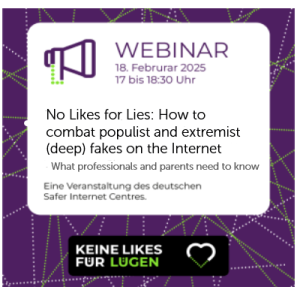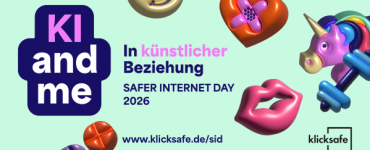More than 800 schools, associations, libraries and initiatives are participating in Safer Internet Day 2025! The high level of participation across Germany demonstrates broad commitment to a better Internet and against manipulative disinformation. The Digital School Lesson, which can be streamed directly into classrooms from schools today, is a brand-new and a highly significant initiative: over 25,000 young people are learning how to recognise extremist fake news and what they can do about it. In Germany, Safer Internet Day has been organised for over 20 years by the klicksafe EU initiative.
Media literacy is the key to a strong democracy. That’s why hundreds of institutions across Germany have therefore joined this year’s klicksafe appeal “No Likes for Lies!” and are sending a strong signal today on Safer Internet Day for a better Internet for children and young people. The significant increase in manipulative deepfakes, extremist content, and populist misinformation online highlights the urgent the need for action. According to the JIM study, 61% of young people surveyed have already been confronted with fake news online, 54% have been exposed to extreme political views, and 43% have encountered conspiracy theories (JIM 2024).
Lisa Paus, the German Federal Minister for Family Affairs, Senior Citizens, Women and Youth, emphasises: “Misinformation is spreading faster than ever before – and that is precisely what poses a threat to our democracy. Young people must learn how to identify fake news, expose deepfakes and question extremist content. Media literacy is the key to navigating the digital world safely – and it starts with critical thinking and facts instead of fakes. The figures show how urgent the need for action is: more than half of young people have already been confronted with fake news or extremist content. We cannot simply accept this! We need to equip young people with the right tools and firmly anchor digital education into schools and society. Because those who learn today to recognise misinformation will protect our democracy tomorrow.”
Dr Marc Jan Eumann, Director of the Media Authority of Rhineland-Palatinate and Chair of the Commission for the Protection of Minors in the Media (KJM), adds: “Instead of lies, we need facts and fair rules online. The major platforms are called upon to live up to their responsibility and remove anti-democratic content. If the algorithm pushes lies, hatred and incitement onto your mobile phone, klicksafe provides the right guidance – because media literacy is democracy literacy.”
Together, the partners of the Safer Internet DE network are implementing this year’s Safer Internet Day motto “No Likes for Lies! Recognising extremism, populism and deepfakes online” with a wide range of offers. In doing so, they are reaching out not only to thousands of pupils, but also to teachers, other educational professionals and parents. In addition to the klicksafe awareness centre, the network includes the eco Complaints Office, FSM and jugendschutz.net, as well as the consulting services of “Nummer gegen Kummer e.V”.
“Deepfakes open up new dimensions of manipulative deception and have the potential to heavily influence public opinion. We all need to become more confident in dealing with (dis)information online and are therefore delighted about the high level of participation in Safer Internet Day,” emphasises Deborah Woldemichael, Coordinator of the German Safer Internet Centre.
Around 300 events, offers and projects are planned across Germany for Safer Internet Day. All activities, materials and further information can be found at klicksafe.de/sid. The campaign day and month are accompanied and discussed in social media with the hashtags #SID2025, #SID25, #KeineLikesfürLügen. The German Safer Internet Centre and the EU klicksafe initiative are offering the following events on Safer Internet Day:
Activities of the Safer Internet DE network
Digital School Lesson on 11 February, 10:00 to 11:30 a.m. Experts in media education and youth media protection from the Safer Internet DE network will provide up-to-date knowledge and key insights on the online strategies of right-wing extremist players on Safer Internet Day.
Webinar “No Likes for Lies: How to combat populist and extremist (deep) fakes on the Internet?” – What professionals and parents need to know, on 18 February, 17:00 to 18:30 p.m. Experts from the Safer Internet DE network provide information about the challenges and options for dealing with populist and extremist (deep) fakes online. Legal aspects, including the evaluation of content in the context of applicable laws and possible legal steps against the dissemination of disinformation, will also be covered. Register here.
Expert and press event on Safer Internet Day
Käthe-Kollwitz-Gymnasium, Berlin, 11 February, 10:00 a.m. to 1:00 p.m. The EU initiative klicksafe is organising workshops, activities and a panel discussion with students at the Käthe-Kollwitz-Gymnasium on the topic of “No Likes for Lies!”. The panel discussion will be attended by Lisa Paus, Member of the German Bundestag and Federal Minister for Family Affairs, Senior Citizens, Women and Youth; Theresa Lehmann, Amadeu Antonio Foundation; Deborah Woldemichael, EU initiative klicksafe; Martin Drechsler, FSM and Gizem Çelik, content creator. Moderator: Polo Türk, Fritz-Radio/rbb and Board Member of Neue deutsche Medienmacher.
About Safer Internet Day
Safer Internet Day (SID) is a global awareness day for a better and safer Internet for children and young people. It has taken place every year since 2004, always on the Tuesday of the second week in February, and each year has a new thematic focus under the international motto “Together for a Better Internet”. In Germany, Safer Internet Day is coordinated by the EU initiative klicksafe.
About the Safer Internet DE network
The European Union’s Digital Europe Programme (DIGITAL) supports Safer Internet Centres in 27 European countries, aiming to enhance media literacy among children, parents and teachers, to raise awareness of potential online risks, and to provide children and young people advice on online problems. In addition, hotlines are also provided for illegal online content. In Germany, the German Safer Internet Centre is implemented by the Safer Internet DE network. This includes the eco Complaints Office, FSM and jugendschutz.net hotlines, the klicksafe awareness centre and the advice services provided by Nummer gegen Kummer e.V.




